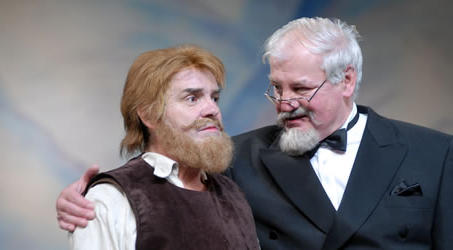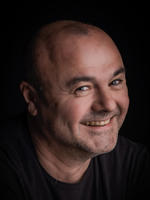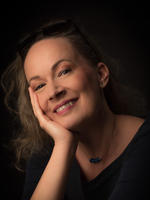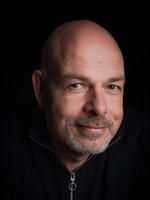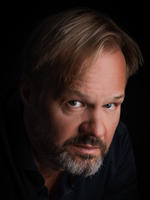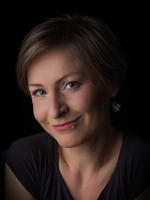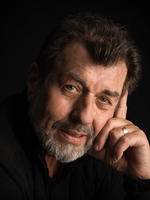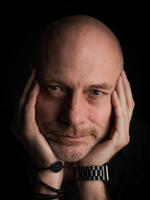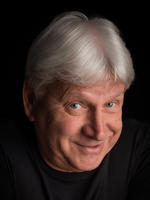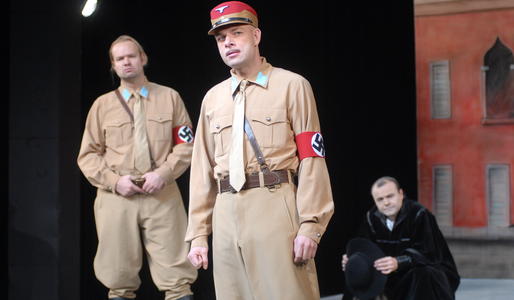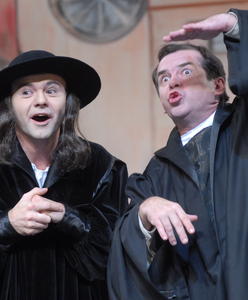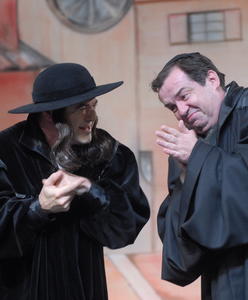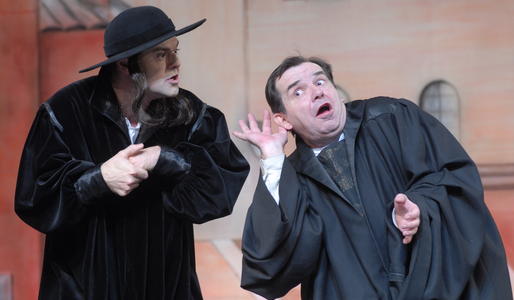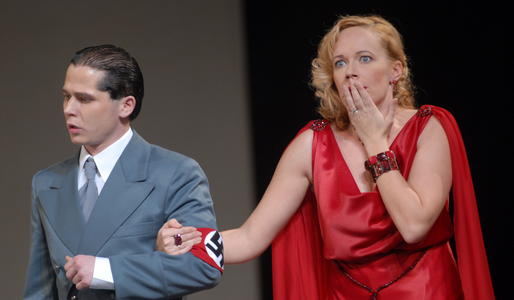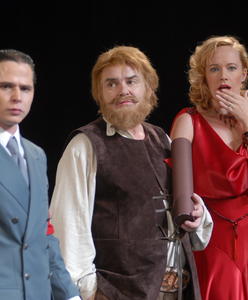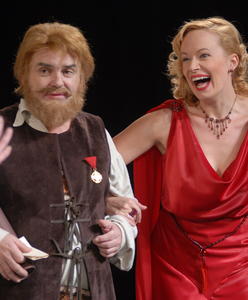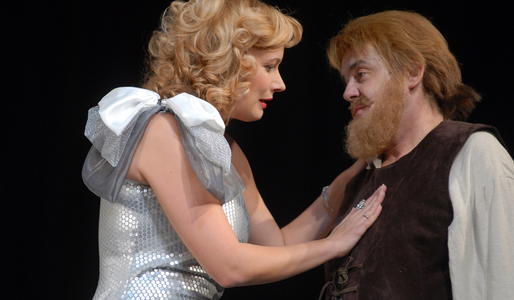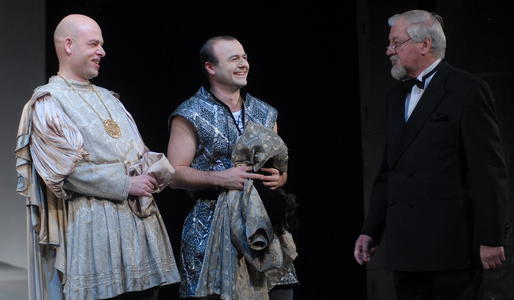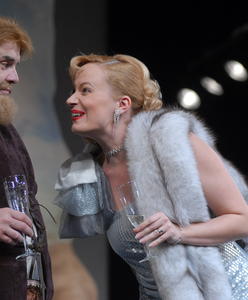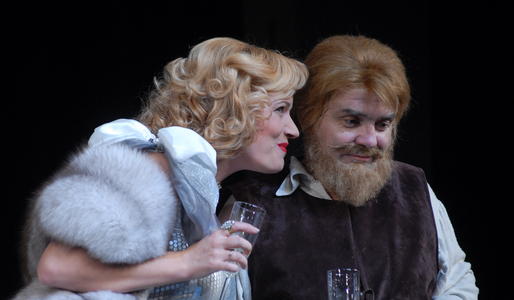A bizarre picture of malignant fanaticism
Vít Závodský 19. February 2007 zdroj Týdeník Rozhlas
Brno City Theatre has recently been spot on in its choices of foreign works to premiere here –whether we are talking about spectacular musicals (Oliver!, Joseph and the Amazing Technicolor Dreamcoat, The Witches of Eastwick) or smaller scale dramas (Devotion to the Cross, Honeymoon Suite). The new show, In the Lion’s Den (1998) from the modern German dramatist Felix Mitterer can be placed in the second group.
It is rare here that a work from a writer and dramatist of the older generation appears on stage – Brno’s “Goose on a String Theatre” once discovered the mystery play Krach im Hause Gott (Účtování v domě Božím). A slightly younger text is this one of many versions, based partially on fact, of the adventurous life of Jewish actor Leo Reuss, who after his scandalous anti-Semitic expulsion from a Berlin theatre ensemble found a new identity in Vienna in 1936 (it was from the local Volkstheatr that Mitterer’s drama began its successful journey through the German-speaking countries) until he eventually ended up emigrating to Hollywood.
Rather like Biblical Daniel, renowned artist Arther Kirsch found himself in the lion’s den (in the middle of Berlin) when after being victimised in his theatre group by his Nazi colleagues – ‘tough guy’ Strassky (Viktor Skála), ‘dirty rat’ Polacek (Tomáš Sagher), Jakschitz (Petr Gazdík) – he re-appeared among them once again as Benedikt Höllrigl, a bumpkin-like hillsman from the Tyrol who shows surprising acting talent. Not only does he neutralize his erstwhile opponents with his extremely militant anti-Semitic views, but he is held up as an example of a perfect Aryan artist by Goebbels himself (young actor Lukáš Kantor plays him without resorting to caricature), and becomes the propagandist’s wife’s lover. The main difficulty in creating this work for dramatist Jiří Záviš was the translation of the original, which the author himself (who attended the Brno premiere and pronounced himself satisfied) believed to be untranslatable. Experienced expert in German matters and rector of JAMU (Janáček’s Academy of Musical Arts) Václav Cejpek created a whole new stylized dialect to express the pseudo-rustic “Tyrolean” used in the original. Director Stanislav Moša decided not to cover numerous examples of Mitterer’s historical licence and improbabilities in the plot and left out various walk-on parts for minor characters. He employs a serious and dynamic, more-or-less conversational treatment of the ‘theatre within a theatre’ aspect of the author’s original with a balance of timeless (Shakespearian and Schillerian passages), emotional, humorous and sarcastic moments. After considering several existing variants Moša decided for a happy end.
The naked stage with painted scenery, stretching over the orchestra pit (Daniel Dvořák), played host to this impressive creation for almost two-and-a-half hours non-stop, featuring impeccably accurate period dress from Andrea Kučerová and the music of Zdeněk Merta. Erik Pardus fully utilized the opportunity given to him by the central double role. He managed to avoid profane comedy clichés and flexibly succeeded in differentiating the character of the internally rebellious Jew who was whistled off the stage, vengeful and forgiving, from the rough, noisy peasant from the Alps.
In a once-off “jump” from her family duties, Alena Antalová was once again magical on stage as Kirsch’s unfaithful partner Helena Schwaigerová – an elegant, affected primadonna and egocentric careerist. We can also savour the characterisations of the neurotic theatre director Maisel (Karel Janský), cultivated in the old-world way, but vainly trying to resist the pressure of Hitler’s ideology, Junák’s honourable stage master Eder, or brave actress Olga Sternbergová (Lenka Janíková), stigmatised by her ‘Jordanian’ origins.
The Jewish Actor Kirsch Stood Its Ground in the Brno's Lion's Den
Josef Mlejnek 4. January 2007 zdroj MF Dnes
The Brno City Theatre presented in its non-musical line the play In the Lion's Den written by the well-known Austrian dramatist Felix Mitterer in the year 1996.
The action takes place in the time of the Nazis' succession to power. This realistic theatre at the theatre is based on the story of actor Leo Reuss who appeared as a Tyrolean mountaineer in Max Reinhardt's theatre in Salcburk in the year 1936 and later in Vienna. In the play, the Jewish actor Kirsch comes back as Benedikt Höllrigl right to Berlin and finds himself in the "lion's den" like the biblical Daniel.
The stage is formed of a long inclined plane - perhaps because all the protagonists are on the slippery slope. At the premiere of Shakespeare's Merchant of Venice, Kirsch (Erik Pardus) acting Shylock is hissed out and the performance is not finished. It seems to the young Nazi Strasski (Viktor Skála) and his henchmen, who organized the hissing out a who have a decisive word in the ensemble, that Kirsch's Shylock is little "Jewish" and push racially unobjectionable Polacek (Tomáš Sagher) through to play the role. Kirsch is expelled out of the theatre, but he comes back soon...
Masterful direction
Authors like Franz Werfel, to whom Mitterer goes near, knew well, unlike their "goyan" colleagues, that the painful facts connected with the Jewish suffering cannot be fully expressed. Fortunately, director Stanislav Moša managed to adapt too sentimental passages to a bearable extent. Alena Antalová playing the role of Kirsch's wife Helen Schweiger was able to present the whole range of exalted and egoistical positions of primadona's behaviour, but she remained equally convincing at the moments when all masks and "roles" were uncovered.
Lukáš Kantor does not caricature her friend Goebels, he just imprinted an infantile, immature puppet-like behaviour into his figure.
A Jewish Actor Admired by the Nazis
Kateřina Bartošová 2. January 2007 zdroj Lidové noviny
The Brno City Theatre presented a premiere of the play In the Lion's Den written by the contemporary dramatist Felix Mitterer.
The story became a legend in the Viennese circles and attracted Mitterer with the motif of the actor who is able to use the theatrical means to resist a tyranny for some time. He is expelled from his theatre, but he comes back in a costume and with the rhetoric of his enemies. The difficulties connected with the translation arose from the necessity to differentiate intelligibly between the standard German and the Tyrolean dialect between which the protagonist Arthur Kirsch is balancing.
Václav Cejpek coped with it well and created the translation which does not use any Czech dialect or local slang as a parallel of the language of Tyrolean mountaineer, but he used an artificially deformed standard language, coming also out of the Tyrolean dialect. The performance brings an unexpectedly quiet, good performance of Erik Pardus in the title role of Arthur Kirsch, the stage designed by Daniel Dvořák is also effective.
It Holds until Now: The Smaller the Artist, the Bigger the Nazi
Jiří P. Kříž 14. December 2006 zdroj Právo
Stanislav Moša introduced the Irish Tyrolean Felix Mitterer with his play In the Lion’s Den at the Brno City Theatre.
Sixty years after the World War II its tragic stories still revive. Just the pain is reduced with time and is changed into a bitter humour, smilingness, and frequently into the self-irony of the humiliated and massacred, and in the sarcasm referred to the supermen of the Third Reich.
The newest contribution: in Felix Mitterer’s play In the Lion’s Den at the Brno City Theatre.
Translated by Václav Cejpek, directed by Stanislav Moša.
A happy choice. Germany, the thirst third of the 1930’s. Hitler’s half-intelligent representatives of national socialism (confused with social democracy by one of our geniuses of averageness, the Central Bohemian commissioner Bendl, sixty years after the World War II) squeeze their way to the power... Jude raus! Swing tanzen verboten! The Merchant of Venice is to change in the figure of Shylloc in a sanguineous, treacherous Jew. But he is played by a Jewish actor Arthur Kirsch.
From a farmer to an artist
It could not come out well. It was enough to organize a spectators’ demonstration for a race purification and Kirsch is dismissed from the theatre due to his Nazi colleagues. And a small analogy again: When will we get to know at last which actors, later appointed national artists, endeavoured to expel Hugo Haas from the Prague “Golden Chapel” in the second half of the 1920’s?!
However, the expulsion of the Jew from the theatre is just a beginning. One day, a group of Nazis who took over the power at the theatre (Viktor Skála, Petr Gazdík, Tomáš Sagher), force on the theatre director Meisl (Karel Janský) to admit the genial Tyrolean farmer Benedikt Höllrigl, bearer of race principles, resolute anti-Semite, who decided, influenced by the leader’s idea about the German nation’s regeneration, to leave the Alpine ox pasture and become an actor.
His colossal success, disseminated throughout the country due to the care of comrade reviewers, reaches the ear of the ideologic strategist Goebbel (Lotrando-like epicene Lukáš Kantor). He also duly appreciates and celebrates his Tyrolean fellow-countryman. Everything else is the work of Mitterer’s masterful authorial licence. The story of real actor Leo Reuss, a model of actor Kirsch, could not reach understandably such a final victory and ridicule creators of the race laws.
And we are at home
I cannot keep from comparing it with the production of the newly opened Karlín Music Theatre. Hitler is ridiculed there a la American way. The play In the Lion’s Den, written by the Tyrolean writer from Kitzbühelsk living in Ireland, reflects a bitter European experience of the “Norimberk’s legacy”, the world dominated by lunatic leaders of the 20th century. The Mitterer’s play fell on a fertile ground in our country. That will do to substitute the word race with class. And we are at home.
Moša’s direction did not try to make the intention transparent with literality. The dialogues flow easily, half seriously and half in irony.
The stage designed by Daniel Dvořák, oscillating from the correspondence with the severity of the story up to the hyperrealistic character of coulisses of the beginning of national-socialistic era, is putting the finishing touches to the style of the performance. As always, the costumes designed by Andrea Kučerová respect the stylization of the period reality, as well as the specious grand German music themes by Zdenek Merta, stressing the ideological delusion.
Bravo Erik Pardus!
One of the best dramatic performances of the year 2006 is presented by Erik Pardus in the double role of Kirsch and Höllrigl. From the positions of touching pain of the Jew in the middle of brown flood, who witnesses betrayals of his own wife (equally expressive Alena Antalová) disguised as an unknown Tyrolean, up to the sarcastic mockery of dull and bad power. Of course, the latter positions suit Pardus even more. In one word – impressive!
Besides the mentioned representatives of Nazis and SS-men (Igor Ondříček, Jiří Zmidloch), the humanity is added to the story by Zdeněk Junák (stage master Eder), Lenka Janíková (actress Olga Sternbergová) and Jan Mazák (the real Tyrolean farmer Höllrigl). Well, a beautifully commercial theatre. Detractors of the Brno City Theatre will not sleep a wink again.
The Author Participated in the Premiere
tr 13. December 2006 zdroj Právo
Felix Mitterer (in the middle), author of the play In the Lion’s Den, came to the Czech Premiere performed on Friday at the Brno City Theatre. He called this Stanislav Moša’s performance beautiful and humble. On the left: Alena Antalová, a brilliant protagonist of one of the two principal roles. On the right: Erik Pardus, playing the Jewish actor expelled by Nazis from the theatre and coming back disguised as a Tyrolean farmer, presents his life performance.
In the Lion’s Den
David Kroča 1. December -1 zdroj ČRo 3 Vltava
Felix Mitterer’s play In the Lion’s Den was written according to an authentic story reputedly told in Viennese dramatic circles. From the real story about the Jewish actor Reuss, who came back to the stage disguised as an Aryan after his dismissal motivated by race, the dramatist used not only the plot, but also the theme of personal bravery in an extreme situation. The author himself said at the meeting with newspapermen held after the Brno premiere that the principal story motives served him as an outline of the drama dealing mainly with the resolution to resist a senseless ideology.
Arthur Kirsch, protagonist of the drama, comes back to a theatre in Nazi Berlin, he enters the lion’s den really like a biblical Daniel. The Jewish actor in the mask of a jolly Tyrolean farmer makes people laugh on one hand, but on the other hand, he acts as an unmerciful revenger liquidating his enemies with their own weapons. He even destroys the regime’s minion Polacek by revealing putative Jewish features in his face: Thus, he returns him his degrading sack from the theatre with returns.
The director Stanislav Moša managed to interconnect comic and tragic situations in an impressive way. The source of humour is especially in the scenes of disguised Kirsch, whose Tyrolean language is a hard nut to crack for a translator. The translator Václav Cejpek played with contrasts between the literary Czech language and a stylized speech of a peculiar farmer. The closely tight text is framed in the monologue of the Jew from Shakespeare’s Merchant of Venice: while at the beginning it is an intentional actor’s rank, at the conclusion the hero speaks about the Jewish fate sensitively, but without any pathos. One of key scenes is built brilliantly: masked Kirsch has an opportunity to discredit the entire system at the moment when he is honoured by minister Goebbels as an exemplary Nazi actor and is to speak to a microphone at the stage.
Surprisingly, the expected unmasking in front of the Nazis dos not take place as the hero has other, more important tasks – as if by the way he saves the life of his Jewish woman colleague in the subsequent conversation with the Publicity Minister.
The principle of a theatre at the theatre is simplified by Daniel Dvořák’s stage design with simple pasted decorations and Zdenek Merta’s music creating a proper atmosphere is a becoming element of the performance.
In the Lion's Den
Jiří P. Kříž 1. December -1 zdroj XANTYPA
Germany in the first third of the 1930's. Hitler's experts are pushing their way to the power. Jude raus! The Merchant of Venice, Shyllock, is to change in a portrait of a treacherous Jew. But he is played by a Jew Arthur Kirsch. It was enough to organize a spectators’ demonstration for a race purification and Kirsch is dismissed from the theatre due to his Nazi colleagues. However, everything only starts with the expulsion of the Jordanian in the Lion's Den in the Brno City Theatre. One day, a group of Nazis who took over the power at the theatre, push through on the stage a genial Tyrolean farmer Benedikt Höllrigl, a bearer of racial principals and a severe anti-Semite, who decided, influenced by the leader’s idea about the German nation’s regeneration, to leave the Alpine ox pasture and become an actor.
His colossal success, disseminated throughout the country due to the care of comrade reviewers, reaches the ear of the ideologic strategist Goebbel. He also duly appreciates and celebrates his Tyrolean fellow-countryman. Everything else is the work of Mitterer’s masterful authorial licence. The Mitterer’s play fell on a fertile ground in our country. That will do to substitute the word race with class. One of the best dramatic performances of the year 2006 is presented by Erik Pardus in the double role of Kirsch and Höllrigl. From the positions of touching pain of the Jew in the middle of the brown flood, who witnesses betrayals of his own wife (equally expressive Alena Antalová) disguised as an unknown Tyrolean, up to the sarcastic mockery of the dull and bad power. In one word – impressive!
In the Lion's Den
Peter Stoličný 1. December -1
Always topical theme on the Brno stage
Once, the prophet Daniel found himself in the lion's den. In the 1930's, actor Arthur Kirsch also finds himself among lions as he is not only an excellent a beloved actor, but also a Jew. Being gradually left by everybody, he has to leave the theatre and hides himself at a Tyrolean farm (another Mitterer's return to his roots). Later he returns to Berlin as a marvellous talented Tyrolean mountaineer and becomes very quickly a super actor, an idol of praised Aryan race. He is famous again and loved by the Nazis.
The bitter tragicomedy In the Lion's Den is not only about antisemitism, but it also uncovers unmercifully human weaknesses. Kirsch's revenge is sweet. As soon as he gets in the sunshine again, he accuses the most active Nazi that he is a concealed Jew, he overtakes initiative himself and shows his blinded and unconcerned theatre colleagues the taste of persecution and fear. However, Kirsch must be revealed finally. Some of his closed friends get to know soon what brave or rather lunatic game their colleague started, but they keep silent. Finally, the actor himself reveals the entire truth about his "Aryan geniality" right in front of Goebels and newspapermen. He knows what he is in for, but he believes that it was worth it.
It would seem that the play about fanatic antisemitism is not topical in these latitudes. But if you recall occasional noisy manifestations of neo-fascists and it gives you the shivers when you realize how little was changed in the heads of some people in the last century. Recently, the crying "Bohemia to Bohemians" was heard in Brno in the evening after a football match when we got a goal from a black foreigner. And in Banska Bystrica, after the Czechs defeated the Slovaks at the World Championship, the old chanting could be heard: "Czechs walk to Prague and Jews to gas!". Do not be wrong, it was not in the year 1939, but in the year 2006! What does this hate consist in? In human stupidity, inferiority complex, or are these fruits of racial or any other global hate encoded in the man? In his endowment to survive? Is it possible to enforce in society any humanistic ideals which would include the mechanism of self-defence against such a mass idiotism? This is what Felix Mitterer asks in his play.
The performance presented at the Brno City Theatre meets all ideas about a high-quality performance. Director Stanislav Moša did not use the translation available at the Prague Dramatic Institute, but he asked an experienced theatre expert, Prof. PhDr. Václav Cejpek, JAMU's rector, to translate the text. He proved his extraordinary sense of language and drama in his previous translations. I do not know to what extent director Moša adapted the text. In spite of its demanding character, the text is eminently scenic – including the interpretation of dialect, which is always a problem. (The former famous actor Kirsch comes back to the theatre as a Tyrolean mountaineer Höllrigl and speaks the Tyrolean dialect.)
The story taking place in the decoration of touches on the stage designed by Daniel Dvořák and in the costumes by Andrea Kučerová must be dominated by the dramatic performance. And it really is dominant. Supported by the functional music composed by Zdenek Merta, a gradual fall of the famous actor, who is a Jew first of all after the rise of fascism in Germany, is depicted. Then he returns triumphantly as a Tyrolean Aryan, a model of pure race, who becomes a famous actor, but all of us know what tragedy is hidden behind the triumph. The double role of the protagonist – the Jewish actor and the Aryan actor - is hard, but appreciative. It is as if it were made-to-measure for Erik Pardus. Pardus always finds his comic position where there is also a place for uncertainty, sadness and sorrow. He is a real clown who can make you laugh as well as shiver. He mastered his Jew exactly in such a way. And when he showed Shakespeare's Shylock, first in the excellent monologue, and later as a figure of a "disgusting Jew" in the same monologue before the NSDAP's representatives, then you must say – hats off. And simultaneously, you will get the idea: Such a beautiful role appears only several times in a life! And another person really deserves mentioning - Helen Schweiger, Kirsch's wife. The Berlin super star with all becoming manners. The woman who refuses to understand in what time she is living first. A Jew's wife. Gradually, the circumstances will force her to discover the horror of the regime. But she cannot and does not want to give up her marvellous dramatic carrier. In fact, she gives up (must give up?) her Jewish husband and collaborates with the regime. She must get through a lot of complicated emotional processes. She is not amoral. The world surrounding her is amoral.
This beautiful role was given to a graduate from the course of musical acting at the Bratislava Conservatory, Alena Antalová. The well-known star of popular Czech serials is an excellent theatrical actress first of all. She proved this many times at the Brno City Theatre in vocal and dancing creations in several musicals (The World Full of Angels, Nana, Babylon, My Fair Lady) or as a dramatic actress of the world classic (Cyrano, The Servant of Two Masters, The Mascarade). The role in the Mitterer's play was as if it were made-to-measure for her. The star played a star, and surely thanks to the sensitive director's management with the smallest nuances of the woman who must fall down the star heights to the reality of the starting totalitarian regime where there is no place for his Jewish husband.
I think all roles and their protagonists would deserve enumeration one after another, but perhaps that will do to repeat the well-known bon mot that there are no small roles if they are played by great actors.
The Brno's performance In the Lion's Den witnesses suggestively the fact that people create history, but the history is able to change human characters, either to strengthen or warp them. In contrast to the principles of ancient drama where the Fate determines what will happen, in the Mitterer's play people are able to fight and defeat the Fate, at least for a while. Moreover, it is a game speaking (unfortunately) about the past and the present. Anyway, the cry "Czechs walk to Prague and Jews to gas!" still sounds in my ears. This is one face of our Central Europe. And that is why the Mitterer's play is still topical.
About the Lion’s Den
M. Vidláková 1. December -1 zdroj Terezínská iniciativa
On Friday 8th December 2006 on Brno’s drama stage, the premiere of Felix Mitterer’s theatre play “In the Lion’s Den” was performed under the direction of Stanislav Moša.
In the subtitle it is written that it is a drama about human relationships. But it is far more than that. It is difficult to find a word that would express feelings about it that does not give away the plot. And that is something I do not want to do, because this is something you just have to see.
See? No. Live through. The spectator, and particularly the Jewish spectator, lives through those two and a half hours without a break along with the main hero of the story, a Jewish actor in Germany in the nineteen-thirties, almost unable to draw breath. It is not a drama about relationships, but a fight for human dignity, about respect for oneself, which is victorious over the fear of death.
Erik Pardus was so convincing in his performance as the Jewish actor that I couldn’t stop myself from asking him if he hadn’t had any personal experience with the issues in the play. He said he had.
If it comes to Prague or perhaps the North Pole, go and see it. It’s worth it; it was a deep experience.

